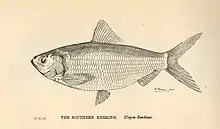| White sardinella | |
|---|---|
 | |
| Scientific classification | |
| Domain: | Eukaryota |
| Kingdom: | Animalia |
| Phylum: | Chordata |
| Class: | Actinopterygii |
| Order: | Clupeiformes |
| Family: | Dorosomatidae |
| Genus: | Sardinella |
| Species: | S. albella |
| Binomial name | |
| Sardinella albella (Valenciennes, 1847) | |
| Synonyms | |
| |
The white sardinella (Sardinella albella), also known as deep-bodied sardine, perforated-scale sardine or short-bodied sardine, is a species of ray-finned fish in the genus Sardinella.[1] It is an important food fish, which can be feed as dried, salted, or fresh forms.
Description
It is distributed throughout the Indo-West Pacific oceans from Madagascar, around India, Sri Lanka, and eastward to Indonesia, Taiwan and south to Papua New Guinea.
It is a small schooling fish found in depth of 20-50m. Maximum length do not exceed 21.5 cm. The fish has 13 to 21 dorsal soft rays and 12 to 23 anal soft rays. There is a dark spot at origin part of dorsal fin. It feeds on small planktons.
See also
References
- ↑ Froese, Rainer; Pauly, Daniel (eds.) (2014). "Sardinella albella" in FishBase. August 2014 version.
This article is issued from Wikipedia. The text is licensed under Creative Commons - Attribution - Sharealike. Additional terms may apply for the media files.
